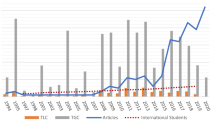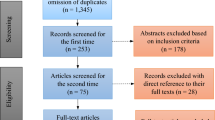Abstract
Assessment has become an important topic of debate and even reform in many Western countries. It is equally important in other regions of the world, although less subject to reform. Yet discussions of assessment across cultural boundaries are not frequent and in a globalizing world this can be problematic. The purposes of this article, therefore, are to review concepts such as ‘formative’ and ‘summative’ assessment and how they have developed over time. A focus of this review will be to identify the implications of different kinds of assessment for student learning, especially in relation to the cultural contexts in which they take place. The article will argue that different forms of assessment can be directed towards different learning purposes, especially where cultural pressures dictate certain kinds of assessment practices. Valorizing one form of assessment over another may well be counterproductive in particular cultural contexts.
Similar content being viewed by others
References
Assessment Reform Group. (1999). Assessment for learning: Beyond the black box. Cambridge: University of Cambridge School of Education. http://arg.educ.cam.ac.uk/AssessInsides.pdf. Accessed 2 March 2006.
Assessment Systems for the Future. (2005). Summative assessment by teachers: Evidence from research and its implications for policy and practice. ASF Working Paper No 2. http://k1.ioe.ac.uk/tlrp/arg/ASF%20Working%20Paper%202%20Draft%204.pdf. Accessed 9 March 2006.
Biggs J. (1996a) Assessing learning quality: Reconciling institutional, staff, and educational demands. Assessment and Evaluation in Higher Education 2(1): 3–25
Biggs J.B. (1996b) Western misperceptions of the Confucian-heritage learning culture. In: Watkins D.A., Biggs J.B.(eds) The Chinese learner: Cultural, psychological and contextual influences. CERC & ACER, Hong Kong & Melbourne, pp 45–67
Biggs J. (1998) Assessment and classroom learning: A role for formative assessment?. Assessment in Education: Principles, Policy and Practice 5(1): 103–110
Black, P., Harrison, C., Lee, C., Marshall, B., & Wiliam, D. (2003a). Formative and summative assessment: Can they serve learning together? Paper Presented at the Annual Meeting of the American Educational Research Association, Chicago, 23 April 2003. http://www.kcl.ac.uk/education/papers/AERA%20ClassAsst.pdf. Accessed 1 March 2006.
Black, P., Harrison, C., Lee, C., Marshall, B., & Wiliam, D. (2003b). The nature and value of formative assessment for learning. Paper Presented at the Annual Meeting of the American Educational Research Association, Chicago, 23 April 2003. http://www.kcl.ac.uk/education/papers/AERA%20Pres.pdf.Accessed 1 March 2006.
Black P., Wiliam D. (1998) Assessment and classroom learning. Assessment in Education 5(1): 7–74
Boud D. (2000) Sustainable assessment: Rethinking assessment for the learning society. Studies in Higher Education 22(2): 151–167
Broadfoot P. (1999) Education assessment and society. Open University Press, Buckingham
Broadfoot P. (1999) Preface. In: Filer A.(eds) Assessment: Social practice and social product. RoutledgeFalmer, London, pp ix–xii
Brookhart S., De Voge J. (1999) Testing a theory about the role of class-room assessment in pupil motivation. Applied Measurement in Education 12: 409–425
Budge, D. (2005). Tasting the assessment soup—The Times Educational Supplement. http://www.tes.co.uk/search/story/?story_id=2074776. Accessed 2 March 2006.
Chui M.M., Ho E.S.C. (2006) Family effects on student achievement in Hong Kong. Asia Pacific Journal of Education 26(1): 21–36
Curriculum Development Council. (2001) Learning to learn: The way forward in curriculum development. Hong Kong SAR Government, Hong Kong
Department of Education and the Arts. (2005). Smarter learning: The curriculum, assessment and reporting framework. http://education.qld.gov.au/qcar/pdfs/qcar.pd. Accessed 2 March 2006.
Educational Institute of Scotland. (2002). Assessment 3–14. http://www.eis.org.uk/pdffiles/Assessment3-14.pdf. Accessed 2 March 2006.
Filer, A. (eds) (2000) Assessment: Social practice and social product. RoutledgeFalmer, London
Gielen S., Dochy F., Dierick S. (2003) Evaluating the consequential validity of new modes of assessment: The influence of assessment on learning, including pre-, post-, and true assessment effects. In: Segers M., Dochy F., Cascallar E.(eds) Optimising new modes of assessment: In search of qualities and standards. Kluwer Academic Publishers, Netherlands, pp 37–54
Gioka O. (2007) Teacher or assessor? Balancing the tensions between formative and summative assessment in science teaching. In: Haves A., McDowell L.(eds) Balancing dilemmas in assessment and learning in contemporary education . Routledge, New York, pp 145–156
Gipps C. (1999) Socio-cultural aspects of assessment. Review of Research in Education 24: 355–392
Gow L., Balla J., Kember D., Hau K.T. (1996) The learning approaches of Chinese people: A function of socialization processes and the context of learning?. In: Bond M.(eds) The handbook of Chinese psychology. Oxford University Press, Hong Kong, pp 109–123
Harlen W. (2005) Teachers’ summative assessment practices and assessment for learning-tensions and synergies. The Curriculum Journal 16(2): 207–223
Harlen W. (2006) On the relationship between assessment for formative and summative purposes. In: Gardner J.(eds) Assessment and learning. Sage Publications Ltd, London, pp 103–117
Harlen W. (2007) Assessment of learning. Sage Publications Ltd, London
Kennedy, K. (2007). Barriers to innovative school practice: A socio-cultural framework for understanding assessment practices in Asia. Paper Presented at the Symposium: “Student Assessment and its Social and Cultural Contexts: How Teachers Respond to Assessment Reforms”. Redesigning Pedagogy—Culture, Understanding and Practice Conference, Singapore, 28–30 May. http://conference.nie.edu.sg/2007/paper/papers/STUSY016A.pdf. Accessed 1 June 2008.
Kennedy K., Lee J. (2008) Changing schools in Asia: Schools for the knowledge society. Routledge, London
Kwok P. (2004) Examination-oriented knowledge and value transformation in East Asian cram schools. Asia Pacific Education Review 5(1): 64–75
Learning and Teaching Scotland. (2006). Assessment is for learning programme. http://www.ltscotland.org.uk/assess/about/index.as. Accessed 2 March 2006.
Lee, H. M., & Yiu, K. H. (2006, March 8). Secondary school spends $140,000 on training students for assessment (in Chinese). Ming Pao, p. A18.
New Zealand Education Gazette. (2002). Better assessment likely.http://www.edgazette.govt.nz/articles.php/show_articles.php?id=6155. Accessed 2 March 2006.
OECD. (2005). Formative assessment: Improving learning in secondary classrooms. Paris: OECD.
Pryor, J., & Crossouard, B. (2005). A sociocultural theorization of formative assessment. Paper Presented at the Sociocultural Theory in Education Research and Practice Conference, University of Manchester, 8–9 September.
Ramaprasad A. (1983) On the definition of feedback. Behavioral Science 28: 4–13
Roos B., Hamilton D. (2005) Formative assessment: A cybernetic viewpoint. Assessment in Education 12(1): 7–20
Sadler D.R. (1989) Formative assessment and the design of instructional systems. Instructional Science 18: 119–144
Saskatchewan Learning. (1993). Learning assessment program. http://www.sasked.gov.sk.ca/branches/cap_building_acct/afl/docs/plap/foundation.pdf. Accessed 2 March 2006.
Scottish Executive. (2003). Assessment, testing and reporting 3–14: Consultation on partnership commitments. http://www.scotland.gov.uk/consultations/education/atrc-00.asp. Accessed 2 March 2006.
Scriven M. (1967) The methodology of evaluation. In: Tyler R., Gagne R., Scriven M.(eds) Perspectives of curriculum evaluation. Rand McNally, Chicago, pp 39–83
Spencer, E. (2005). Assessment in Scotland: ‘Assessment for learning’. Formative assessment in a coherent system. Presentation made at the International Conference, “Improving Learning through Formative Assessment”, OECD, Paris, 2–4 February. http://www.oecd.org/dataoecd/40/54/34488069.ppt#7. Accessed 5 March 2006.
Stevenson H., Lee S.Y. (1996) The academic achievement of Chinese students. In: Bond M.(eds) The handbook of Chinese Psychology. Oxford University Press, Hong Kong, pp 124–142
Stiggins R. (2002) Assessment crisis: The absence of assessment for learning. Phi Delta Kappan 83(10): 758–765
Taras M. (2005) Assessment-summative and formative—some theoretical reflections. British Journal of Educational Studies 53(4): 466–478
Thomas G. (2006) An investigation of the metacognitive orientation of Confucian-Heritage culture and non-Confucian-Heritage culture science classroom learning environments in Hong Kong. Research in Science Education 36(1–2): 85–89
Torrance H., Pryor J. (2001) Developing formative assessment in the classroom: Using action research to explore and modify theory. British Educational Research 27(5): 615–631
Wiliam D., Black D. (1996) Meanings and consequences: A basisfor distinguishing formative and summative assessment. British Educational Research Journal 22(5): 537–548
Zeng K. (1999) Dragon gate: Competitive examinations and their consequences. Cassell, London
Author information
Authors and Affiliations
Corresponding author
Rights and permissions
About this article
Cite this article
Kennedy, K.J., Chan, J.K.S., Fok, P.K. et al. Forms of assessment and their potential for enhancing learning: conceptual and cultural issues. Educ Res Policy Prac 7, 197–207 (2008). https://doi.org/10.1007/s10671-008-9052-3
Received:
Accepted:
Published:
Issue Date:
DOI: https://doi.org/10.1007/s10671-008-9052-3




